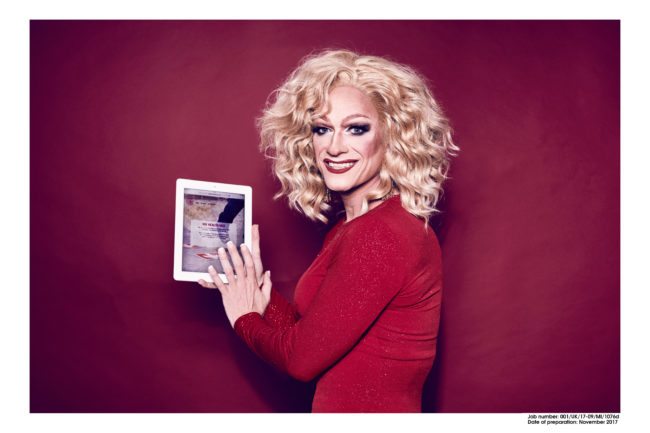Interview: Panti Bliss fronts new interactive online tool for HIV+ people

Irish drag queen Panti Bliss has helped to launch a new campaign aimed at helping people plan their “HIV journey”.
The LGBT activist was diagnosed as HIV positive more than two decades ago, at a time when treatment wasn’t yet what it is today.
The new tool HIV Health MOT, which Panti is fronting, offers users a range of links to online resources for more information, and the ability to create a personalised checklist of topics to discuss with a healthcare professional.
We spoke to Rory O’Neill, the man behind the ‘Queen of Ireland’, about his own HIV journey, having found out he was positive over 20 years ago, at a time when the treatment and attitude around the disease were very different.

PinkNews: Hi Rory, great to speak to you, and happy birthday! So tell me a little about your own HIV journey. You were diagnosed over 20 years ago, what was the difference for you coming out as gay versus coming out as HIV positive?
Get more information on the HIV MOT here.
Rory: Well, I told my family I was HIV positive at a time when it was a much scarier thing. I would have preferred to tell my family I was gay fifty times over than tell them that I was HIV positive then.
At the time, over 20 years ago, what I was telling my parents was that I was probably going to die. No parent should have to go through that, it’s a really horrible thing.
When I told my parents I was gay, it was like telling them I had blue eyes, it was out of my control. But when I told them I was HIV positive, I felt like I was telling them about this thing that I could have avoided.
But I do think attitudes are changing, and if I was telling them now, I would simply say that I have it under control, and I’m going to manage it.
PinkNews: Do you feel as though some younger gay men are becoming complacent about HIV awareness, because they are so disconnected from the days of the epidemic?
Rory: In a sense yes, because if you are a young gay man living now, there’s a slim chance you’d know anybody who got sick in those days, or know anybody who died because of HIV. They aren’t old enough to remember the terrifying ads they showed on TV during that time.
Unfortunately, I think some of them see it as an “old guys’” problem. So, they may be a little ignorant or unaware, because they don’t have the drive to find out all the latest information.
Young people always think they’re going to live forever anyway, so I do think young gay men are less concerned about it, because they don’t feel as though it’s a part of their world.

Panti Bliss
PinkNews: Do you think people still think of HIV as a “gays only” issue?
Rory: Oh, for sure I do. I think your average man or woman on the street does associate HIV with gay men, I think that’s undeniably true.
There’s still a lot of stigma around HIV, and that stigma has really bad effects on people: it stops them getting tested because they’re afraid of what people might think.
A lot of the stuff I get involved in is actually about de-stigmatising HIV, because if you take away that stigma, people are more likely to get tested regularly, and less likely to pass it on.
PinkNews: What do you think are the most effective ways to de-stigmatise HIV?
Rory: Talk about it! A long time ago I decided I was going to be totally open with the fact that I was HIV positive. With what I do for a living, I began to make jokes about it, because I believe when you laugh at something you have the ability to giggle the fear away.
The single most important thing gay people did to remove stigma was to come out. If every single person who was HIV positive felt that they were able to stand up and tell the world that they have HIV, the stigma would end tomorrow.
Most people believe earnestly that they don’t know anyone who has HIV, but I believe that in fact the majority of people living in the UK will know at least one person who has HIV, but who just hasn’t told them.
PinkNews So, tell me a little bit about the HIV Health MOT, and how it’s helped you as someone who has been living with HIV for 20 years now.
Rory: Well, there are a lot of people like me who are living with HIV who are older, who need to adjust to all the new treatments out there. I am the kind of person who has always been on top of knowing all the information – I would go to the doctor’s office with a pile of information printed off from the internet.
But even for someone like me, it’s nice to have something like the MOT to make things simple. With all the information floating around in your head, it can be quite overwhelming, so the tool helps people living with HIV to think clearly and organise themselves.
PinkNews: You explain in your promo video that you want to help people be “in control of [their] own HIV journey.” Have you ever felt out of control during your own journey when it comes to treatment?
Rory: When you go into the doctor’s office, you always think “oh, the doctor knows best,” but sometimes in the clinic you feel as if you’re being told what to do rather than actually being involved.
It’s your body and your life at the end of the day, so it’s really important to be involved in those decisions.
And sometimes, of course, you do know better! For example, early on in my treatment, I was taking medication with really bad side effects, which I just put up with for ages.
It wasn’t until I accidentally brought it up to my doctor that I was having these side effects, he just said, “Oh, well then let’s try something else.” There are times like that when I think, oh I should have just discussed it with my doctor, if only I had been more confident.

Panti Bliss
PinkNews: Why do you think it is that people are so hesitant to speak to their doctor about their worries?
Rory: Well, I think there are a couple of reasons: part of it is the respect we have for doctors, which of course, I think we should have!
But when you’re 49 years old and you go into the clinic and the doctor is half your age, you feel like, “oh, he knows everything, and I know nothing.” So, you feel a bit small.
Everybody feels a bit small in the doctor’s office, and because there is so much information, it feels like it’s easier to have the decisions made for you sometimes. Which is why something like the HIV MOT helps so much, because it makes things easy to understand, and less scary.
PinkNews: What would you want to see change in the next 5-10 years when it comes to the stigma surrounding HIV?
Rory: What I would like is for the general public to understand properly the incredible advances that are being made in treatments for HIV, and to understand that it is now very much a manageable condition
Of course, some people have it harder than that, but I want the public to know that we are managing the condition – you can’t catch it from us as easily as you think with all the new treatment that’s now available.
At the end of the day, I just want people to have all of the information, because if they do, then there’s nothing to be stigmatised.
We don’t blame people for any other condition, so why do we blame them for this one?

